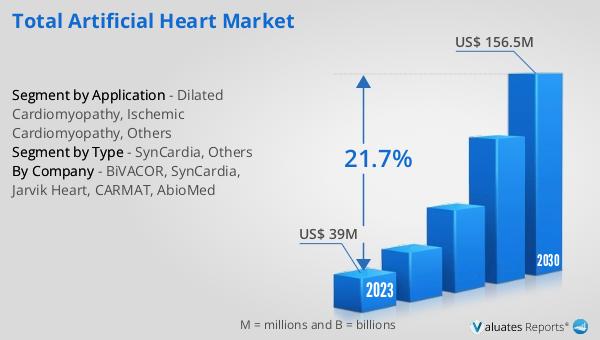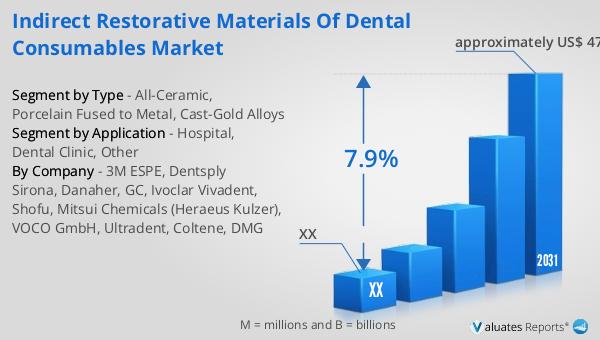What is Global Total Artificial Heart Market?
The Global Total Artificial Heart Market is a specialized segment within the broader medical device industry, focusing on the development and distribution of artificial heart devices. These devices are designed to replace the function of a failing human heart, providing a life-saving option for patients with severe heart conditions. The market is driven by the increasing prevalence of cardiovascular diseases, advancements in medical technology, and the growing demand for heart transplants. Artificial hearts are typically used as a bridge to heart transplantation, helping patients survive until a suitable donor heart becomes available. The market is characterized by a few key players who are investing heavily in research and development to improve the efficacy and safety of these devices. As the global population ages and the incidence of heart diseases rises, the demand for artificial hearts is expected to grow, making this a critical area of focus for healthcare providers and medical device manufacturers alike. The market also faces challenges such as high costs, regulatory hurdles, and the need for specialized surgical expertise, which can limit accessibility and adoption in certain regions. Despite these challenges, the Global Total Artificial Heart Market holds significant potential for growth and innovation.

SynCardia, Others in the Global Total Artificial Heart Market:
SynCardia Systems, LLC is a prominent player in the Global Total Artificial Heart Market, known for its development of the SynCardia temporary Total Artificial Heart (TAH-t). This device is designed to replace both ventricles and all four heart valves, providing a mechanical solution for patients with end-stage biventricular heart failure. SynCardia's TAH-t is primarily used as a bridge to transplant, allowing patients to remain active and stable while waiting for a donor heart. The device has been implanted in thousands of patients worldwide, demonstrating its efficacy and reliability. SynCardia continues to innovate, focusing on improving patient outcomes and expanding the indications for its use. The company is also exploring the potential for its device to be used as a destination therapy, providing a long-term solution for patients who are not eligible for a heart transplant. In addition to SynCardia, other companies are also contributing to the Global Total Artificial Heart Market. These include Abiomed, Carmat, and BiVACOR, each bringing unique technologies and approaches to the market. Abiomed, for instance, is known for its Impella heart pump, which, while not a total artificial heart, plays a crucial role in supporting heart function in patients with severe heart failure. Carmat, a French company, has developed a bioprosthetic artificial heart that mimics the natural heart's function and is designed to reduce the risk of complications associated with mechanical devices. The Carmat heart is currently undergoing clinical trials and has shown promising results in terms of patient survival and quality of life. BiVACOR, an Australian company, is developing a rotary total artificial heart that uses magnetic levitation technology to reduce wear and tear on the device, potentially increasing its lifespan and reliability. The Global Total Artificial Heart Market is characterized by rapid technological advancements and a strong focus on research and development. Companies are investing heavily in improving the design, functionality, and biocompatibility of artificial hearts to enhance patient outcomes and expand their market reach. Regulatory approvals and clinical trials play a crucial role in the market, as companies must demonstrate the safety and efficacy of their devices before they can be widely adopted. The market is also influenced by healthcare policies, reimbursement frameworks, and the availability of skilled healthcare professionals who can perform the complex surgeries required for artificial heart implantation. As the market evolves, collaboration between medical device manufacturers, healthcare providers, and regulatory bodies will be essential to overcome challenges and drive innovation. The Global Total Artificial Heart Market holds significant potential for growth, driven by the increasing prevalence of heart diseases, advancements in medical technology, and the growing demand for life-saving interventions. However, the market also faces challenges such as high costs, regulatory hurdles, and the need for specialized surgical expertise, which can limit accessibility and adoption in certain regions. Despite these challenges, the market is poised for significant growth and innovation, offering new hope for patients with severe heart conditions.
Dilated Cardiomyopathy, Ischemic Cardiomyopathy, Others in the Global Total Artificial Heart Market:
The Global Total Artificial Heart Market plays a crucial role in the treatment of various types of cardiomyopathy, including Dilated Cardiomyopathy and Ischemic Cardiomyopathy. Dilated Cardiomyopathy is a condition characterized by the enlargement and weakening of the heart's ventricles, leading to reduced heart function and heart failure. In severe cases, when medication and other treatments are ineffective, a total artificial heart can be used as a bridge to transplant, providing critical support to patients while they await a donor heart. The artificial heart takes over the pumping function of the failing heart, ensuring adequate blood flow to the body's organs and tissues. This intervention can significantly improve the quality of life and survival rates for patients with Dilated Cardiomyopathy. Ischemic Cardiomyopathy, on the other hand, is caused by the narrowing or blockage of the coronary arteries, leading to reduced blood flow to the heart muscle and subsequent heart failure. In cases where revascularization procedures or medications are insufficient, a total artificial heart may be considered as a treatment option. The device can help restore normal blood circulation and relieve symptoms of heart failure, providing a temporary solution until a heart transplant can be performed. The use of artificial hearts in Ischemic Cardiomyopathy patients has shown promising results, with many patients experiencing improved cardiac function and increased survival rates. In addition to these specific conditions, the Global Total Artificial Heart Market also addresses other forms of severe heart failure that may not be directly related to cardiomyopathy. These include congenital heart defects, myocarditis, and other conditions that result in irreversible damage to the heart muscle. In such cases, a total artificial heart can serve as a life-saving intervention, offering patients a chance to regain their health and improve their quality of life. The versatility and effectiveness of artificial hearts make them a valuable tool in the management of complex cardiac conditions, providing hope for patients who have exhausted other treatment options. The Global Total Artificial Heart Market continues to evolve, with ongoing research and development efforts aimed at improving the design, functionality, and biocompatibility of artificial hearts. These advancements are expected to expand the indications for artificial heart use, making them a viable option for a broader range of patients with severe heart conditions. As the market grows, collaboration between medical device manufacturers, healthcare providers, and regulatory bodies will be essential to ensure the safe and effective use of artificial hearts in clinical practice. Despite the challenges associated with high costs, regulatory approvals, and the need for specialized surgical expertise, the Global Total Artificial Heart Market holds significant potential for growth and innovation, offering new hope for patients with life-threatening heart conditions.
Global Total Artificial Heart Market Outlook:
In 2024, the global market for Total Artificial Hearts was valued at approximately $57.6 million. Projections indicate that by 2031, this market could expand to around $224 million, reflecting a robust compound annual growth rate (CAGR) of 21.7% during the forecast period from 2025 to 2031. North America currently dominates the market, accounting for about 60% of the total market share, followed by Europe, which holds approximately 40%. This growth is driven by several factors, including the increasing prevalence of heart diseases, advancements in medical technology, and the rising demand for heart transplants. The market's expansion is also supported by ongoing research and development efforts aimed at improving the efficacy and safety of artificial heart devices. Despite the promising growth prospects, the market faces challenges such as high costs, regulatory hurdles, and the need for specialized surgical expertise, which can limit accessibility and adoption in certain regions. However, the potential benefits of artificial hearts in saving lives and improving patient outcomes make this a critical area of focus for healthcare providers and medical device manufacturers. As the market continues to evolve, collaboration between industry stakeholders will be essential to overcome challenges and drive innovation, ensuring that artificial hearts remain a viable and effective treatment option for patients with severe heart conditions.
| Report Metric | Details |
| Report Name | Total Artificial Heart Market |
| Forecasted market size in 2031 | approximately US$ 224 million |
| CAGR | 21.7% |
| Forecasted years | 2025 - 2031 |
| Segment by Type |
|
| Segment by Application |
|
| By Region |
|
| By Company | BiVACOR, SynCardia, Jarvik Heart, CARMAT, AbioMed |
| Forecast units | USD million in value |
| Report coverage | Revenue and volume forecast, company share, competitive landscape, growth factors and trends |
